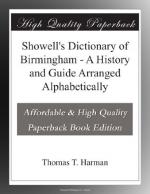Streets.—It is not every street that is a street in Birmingham, for, according to the Post Office Street List, besides a dozen or so to which distinctive names have been given, like Cheapside, Deritend, Digbeth, Highgate, Islington, &c., and 726 streets called Streets, there are in the borough 178 Roads, 86 Lanes, 69 Rows, 19 Squares, 11 Crescents, 2 Quadrants, 5 Arcades, 1 Colonnade, 5 Parades, 484 Terraces, 1,572 Places, 26 Passages, 20 Yards, 47 Courts (named, and twenty times that number numbered), 16 Mounts (twelve of them Pleasant), 24 Hills, 5 Vales, 2 Valleys, 23 Groves, 4 Retreats, 11 Villas, 14 Cottages, 2 Five-Dwelling, 179 Buildings, 14 Chambers, 12 Walks, 4 Drives, 3 Avenues, 5 Gullets, 1 Alley (and that is Needless), 1 Five-Ways, 1 Six-Ways, 6 Greens, 2 Banks, 2 Villages, 3 Heaths, 3 Ends, and 1 No Thoroughfare.
Sultan Divan.—Formerly a questionable place of amusement in Needless Alley, but which was bought for L7,500, and opened by the Young Men’s Christian Association, January 7, 1875.
Sunday in Birmingham.—Sunday dogfights have been heard of in this town, but it was sixty years ago, when brutal sports of all kinds were more rife than now. Prior to that, however, many attempts were made to keep the Sabbath holy, for we read that in 1797 the heavy wagons then in use for transport of goods were not allowed to pass through the town, the authorities fining all offenders who were so wicked as to use their vehicles on the Lord’s Day. The churchwardens were then supported by the inhabitants, who held several public meetings to enforce the proper observance of the day, but there have been many changes since. In January, 1856, a Sunday League, for opening museums, libraries, &c., on the Sabbath, was started here. In the last session of Parliament in 1870, there were eighteen separate petitions presented from this town against




